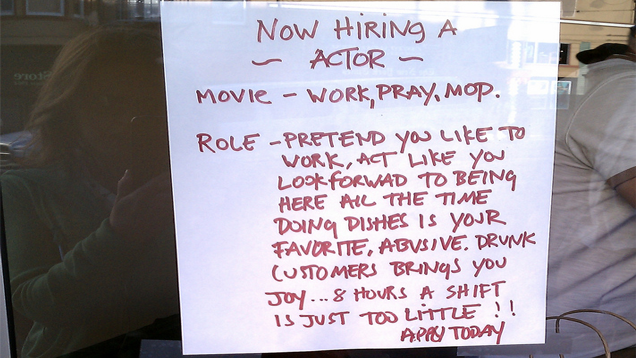Just as companies have to weed out the good candidates from the bad, you need to be able to tell the good companies and positions from the ones that will just waste your time. Here are some red flags in job descriptions and interviews that can warn you about a potentially terrible job.
Photos by Tina Mailhot-Roberge, Shockingly Tasty, Alan Cleaver
Warning Flags In Job Descriptions

Sometimes all you have to do is carefully read the job description. Certain phrases are really code words for “this job will suck your soul”. At the very least, the wording can tip you off to the company’s expectations.
“Must have a good sense of humour”: Most occupations don’t require you to have comedic skills or appreciate comedy, so this should put up a red flag. While many interviewers do appreciate and look for a sense of humour in candidates, if a job listing has this as a requirement it could be a sign that the company culture leans towards the inappropriate or more taxing expectations. Divine Caroline writes:
This may sound strange, but we’ve noticed it popping up in more and more job descriptions. While you may want to believe the company is looking for a candidate who is a big South Park fan, it could mean trouble. The phrase might indicate the company culture tends to be a little inappropriate, so they’re looking for people who can hang with that. It might also mean you’re going to be in a totally stressful, chaotic environment and they’re looking for someone who won’t fall to pieces because of it.
Plenty of things are said in the name of humour at work that could be alienating, and if a job specifically requires a sense of humour, it might be because the company expects you to be tolerant of unusual, if not terrible environments.
“Fast-paced environment”: Some jobs naturally come with fast-paced environments, like day traders on Wall Street and ER surgeons, so the “fast-paced environment” description is apt in these scenarios. But if your occupation doesn’t usually lend itself to that kind of hurry, or if you believe in the go slow to get there faster approach, be wary. The emphasis in the job listing on quick production and busyness is a warning that you probably won’t achieve great work-life balance if you worked at this place. “Must be extremely hard working” or “must be able to handle extremely high stress” are two related red flags of highly demanding companies, Monster says. (Of course, if you thrive in a fast-paced, sadistic environment this could be a job search key phrase for you.)
“Flexible doing other tasks”: Yup, expect to take on other job tasks that aren’t related to the core position. Maybe it’s a small company and everyone has to pitch in to answer the phones or monitor the social media feeds. Without “other tasks” defined, however, you could find yourself taking out the trash or doing very unrelated things at this job. If you see this in the job description, be sure to ask the interviewer what other responsibilities, specifically, you might be called on to help with.
Jobs listed with no company name: On Craigslist and similar sites in particular, you might not know which company listed the job or it might say “Company confidential.” Is it a real job or not? Without a company name, job seekers can’t research the company or know if this is a scam. It’s better to know who you’re really applying to and, if the job is legit, you should expect the company name to be on the job listing.
“Perfect for students or stay at home parents”: On one hand, jobs that target students, stay at home parents, and retirees are usually flexible part-time jobs. On the other hand, adding this benefit or feature of the job to the listing also suggests the pay is going to be as low as it can get and experience is minimal. When these phrases are in the job listing, you’ll also likely be competing against other job seekers who will take much lower pay in exchange for the opportunity.
“Passionate” or any mention of “passion”: This one’s borderline. Companies seek dedicated employees who are passionate about their jobs. But if a company specifically asks for that quality in a job candidate, it could be a sign they want someone who puts their work above all else. As Matthew Graybosch writes on Medium:
Here’s a little tidbit for you. When an employer tells you they value passion in developers, they’re giving you fair warning. Hearing that word is your chance to run as if the Devil himself and all the fallen angels who followed him were gunning for you.
Most of them don’t realise, and don’t expect you to know either, that the word “passion” is a translation of the Greek word πάσχειν paschein, which means ‘to suffer’. Granted, it’s called work because all the other four-letter words are taken, but nobody should have to suffer for a living.
It’s one thing to suffer when you’re an obscure artist, or a spurned lover, or a soldier facing his death, or even Jesus H. Christ himself. But don’t suffer for a paycheck unless you’re the CEO. Otherwise, you don’t get paid enough for that shit.
This might not always be true, but you’ll be able to confirm your suspicions or disprove them during the interview.
Warning Flags In Job Interviews

The next stage of your job search — interviews — can also tell you a lot about a company and the position in subtle or even jarring ways.
The job description doesn’t match the interviewers’ description: The job description says one thing, but in the interview, the position is described differently — perhaps as a higher or lower position with more or fewer responsibilities. Regardless of the reasons for this (possibly a disconnect between HR or whoever wrote the job post and the manager’s view), the discrepancy is definitely something to take note of. This is particularly true if there’s more than one person you’ll be responsible to if you are offered this job and take it. Having previously worked under multiple bosses at the same time — each with differing views of my role at the company — I strongly advise you make sure everyone you’re working for or are responsible to agree what your job actually is. If they can’t tell, you won’t be able to either, and that will just lead to frustration.
The interviewer asks an inappropriate question: There are illegal job interview questions, and others which are more subtly inappropriate. The interviewer is probably just doing his/her job, but if the first contact or experience you have with this company is someone who makes you uncomfortable, that’s probably a red flag for what the rest of the company may be like.
You get a job offer immediately: This sounds like a dream come true, getting the job right out of the gate. It, too, could be a red flag, however. It’s flattering, but if the interview concludes quickly with a job offer, the company might be desperate. Of course, they could also really like you and want to scoop you up when good candidates are hard to come by, but take a day at least to look into the company to make sure what their motivations are.
Benefits and other details aren’t worked out yet or are “classified”: There are several things you’ll need to know to be able to make that important job decision — the salary, benefits package, and even company rules. Forbes points out that if the people you’re talking to can’t explain the “fantastic” benefits package or, when you’re close to getting an offer for the position, they can’t show you the employee handbook or benefits plan, it’s probably time to flee. Either they don’t have their stuff together or they’re hiding something.
Salary and benefits change during the interview and negotiation process: Salary negotiations are an unfortunate part of the job search process. But when you’re courting a company and they’re courting you, it’s a big red flag, if not an insult, if the proposed salary drops from one stage to the next. I interviewed once for a company that described itself as “traditional” (another warning sign. It means “no flexibility”). If I remember correctly, the job was listed at $65,000 to $75,000 depending on experience. I went through the interview, which seemed to go well, although the job seemed to have more responsibilities than the listing specified (see above). When I got the call back for the second interview, the HR person told me the position would pay $60,000 and was I OK with that? Also, it was non-negotiable, she said. I didn’t go to the second interview.
It’s best to negotiate your salarybefore the second interview, but in my mind if a company will offer you less than the salary (or salary range) posted in the job listing, they’re trying to take advantage of you. If you’re being called back for a second interview, you’re probably qualified or at least have potential for working there. But if they lower the benefits during the negotiation process, you know they’re going to nickel-and-dime you the whole time you’re working there.
Most times you can tell a good job fit from a wrong one based on your gut, but it’s not always possible. Some signs of bad jobs are very apparent, like job listings that say you could make ” up to $500,000 a year” (you’re working on commission and must be lucky). Always, though, you should ask what does this requirement say about the company or why is this person asking me this before you dive in, because your time is precious. Company reviews like those on Glassdoor can help, as can keeping your eyes open during the process.

Comments
One response to “The Red Flags You Should Look Out For During Your Job Search”
Also any jobs that state “graduate position” but require 3 years experience, all it means is they want someone experienced but don’t want to pay the full rate.